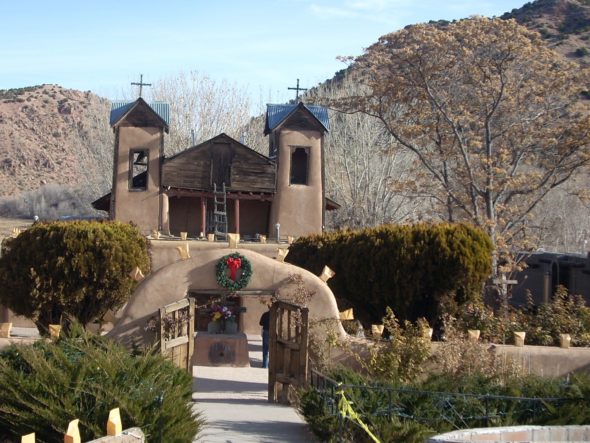

El Santuario de Chimayo, New Mexico. (Photo by Grant Hackett)
BLOG— Happy Hanukwanzamas!
- Published: December 22, 2017
“Merry Christmas,” some people say. “Happy holidays,” others reply. Both terms are pointed.
Years ago I had a friend, culturally but not religiously Jewish, who devised a third greeting: “Happy Hanukwanzamas!” I was there the day he worked it out on a piece of paper, fitting the three words together like a person performing a delicate soldering operation. “I’ve got it!” he said, waving his pencil.
Harry Lazare, this column is for you.
Christmas is wielded like a stick by some. It hardly seems in keeping with the spirit of the season to greet someone with the intent, subconscious or overt, to wound. “Merry Christmas,” hissed out, or spoken a little too loudly.
Because of this use of the term, any use feels a bit funny, to me. “Merry Christmas,” I wrote this week on a card to my stepson and his wife, who have a Christmas tree, who are exchanging gifts. And I cringed slightly as a wrote it. But my pen also loves these words; they take me back to childhood, to hours and hours of Christmas preparations, hand-drawn cards with red and green cursive greetings, showing off new wobbly letters only marginally under my command.
Ours was a totally secular Christmas, and “Merry Christmas” meant cookies, presents, candles in the windows, time off from school, the special feelings that wove through these things.
So I can take or leave “Merry Christmas.” But that’s not the case for some. “Merry Christmas” means the birth of Jesus, it means the day on which the darkness of mystery that envelops all of us yields, a little, to the light. And for those who carry “Merry Christmas” carefully, who tread toward something bright and wonderful like the old Magi did, well, the words themselves are precious.
The words are numinous, something the secular world has a hard time crediting. I am part of that world, religiously unaffiliated, religiously skeptical, yet in middle life I have discovered poetry, and that discovery has, in a line from Swedish poet Tomas Tranströmer, drawn me “upward into/the depths.”
We live in a deep world. We live there, yet it is a struggle to find our way there. I love the inversion of Tranströmer’s image; I think it captures the striving aspect. In a world of gravity, moving upward requires attention and effort. So with entering the depths.
When my husband and I lived in New Mexico, we visited a famous chapel in Chimayo. There is a room inside the chapel that holds holy dirt. Inside this room there is a hole in the floor, an ordinary-looking hole, and a metal spoon you can use to scoop a little dirt, ordinary-looking dirt, into your hand or some small receptacle.
This dirt heals.
To a secular person, that’s preposterous, incredible. It’s dirt! But to the pilgrims — there were pilgrims there, from all over — the dirt carries meaning and therefore actual, physical properties that elevate it from ordinary soil. Watching this, taking it in, I felt my heart give a little flip. A little wriggle of, maybe, happiness.
I’m still secular, I guess, but no longer a believer in the literal. I am a believer instead in the depths.
And so I can understand the attachment some have to words that crystallize the depths of their holiday, their holy day. Are there “Merry Christmas” bullies? Sure. But it’s always best to hear, inside pique and meanness, a hurt heart.
My friend Harry’s coinage was kind of a silly one; he meant it that way. But he was also searching for a word, a single beautiful word, that could carry the weight of holy days. The weight of hearts.
The Yellow Springs News encourages respectful discussion of this article.
You must login to post a comment.
Don't have a login? Register for a free YSNews.com account.










No comments yet for this article.